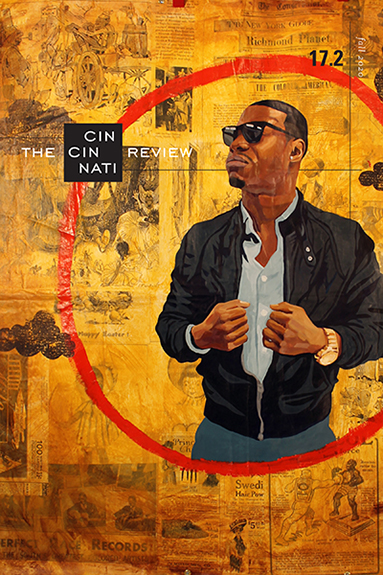from section Four: No One Who Played with the Rolling Stones Ever Lived on Norris Crescent
Even five months, six months, seven months later, you still live among boxes. You arrange them into makeshift walls, section off the part of the living room with your desk. This is your study, itself like a giant cardboard box. Sometimes you do your schoolwork here. Other times you write.
Writing (maybe) an escape. Only, your stories are bad. No feeling, everything that’s real choked off and aborted midway through. All ideas and buzzing thoughts meant to push yourself away from yourself. You can’t imagine ever being a good writer, ever writing a good story or being anywhere else than here, in your box, in the Amedeo Court apartments, in Mimico, where you’d never invite your old friends. You want to write fuck on a box, light light in pencil. You do, and you erase it, and it leaves a dirty smudge.
A neighbor says famous people lived here. This is on Norris Crescent, with its little co-op of brown duplexes, where you walk the dog. The neighbor ashes her cigarette on the metal handrail of her stoop.
In your building, she says. Oscar Peterson. The jazz guy.
That can’t be right. Not Oscar Peterson. Not in our building, where a shirtless guy daily sits on his balcony, points his amp at the lake, and strums his electric guitar.
Yes, Oscar Peterson. In the penthouse. She squints up at the penthouse, points the glowing tip of her cigarette at it. That used to be a real fancy building.
The dog tugs at his leash, whines.
Another guy lived on this street here too, says the neighbor. I think he played with the Rolling Stones.
Here is your new hobby: after your mom goes to bed, you sit in your cardboard box and research the people who lived here before. Does it surprise you to find out it’s true, Oscar Peterson lived here? It does. You didn’t think much of that neighbor before. You thought she might be lying, or maybe she just didn’t know what she was talking about. But here is a passing mention of his penthouse at Amedeo Court, just a sentence or two. All you know of the penthouse is the extra button in the elevator. You need to turn a key in a special lock when you press the button. The keyhole is unusually round. Oscar Peterson must have carried an unusually round key.
Leaves skitter along the boardwalk. Ducklings now ducks. Skinny fires on rocky outcroppings leap at the November sky. Voices carry far in this air, thin and crisp. Bottles clink. In your IKEA bag, straps slung over your shoulders like a backpack, potatoes. Ramen noodles.
Your mom sees junk in the preserve. Plastic pop bottles, straws, napkins, floating on some foamy stuff like soap, dangerously near the nesting area.
This is a protected zone, she says. She leans over the railing. The top of her knit cap flaps over her forehead. I can’t believe people. Now she slings one leg over the railing, now the other. Now she’s edging along the beach.
You’re not allowed in there, you call. Are people looking? Ducks scatter as your mother tiptoes toward the edge of the water, an intruder as unwelcome as the bottles.
The IKEA bag shrugs low on your shoulders.
Your mom, picking up garbage, pinching it between two fingers. She gathers as much as she can while you glance left and right, hoping no one will notice her. Now she’s trudging her way up the bank with an armful of wet junk.
Help me, she says.
No one who played with the Rolling Stonesever lived on Norris Crescent, not as far as you can tell. The only person of any note who ever lived there was a Hungarian, an artist who seemed to hate Toronto even more than you do now. Here’s a little article in the Toronto Star about him, his little duplex on Norris, his studies at the Bauhaus right before the Nazis broke it up, scattered its students and teachers across the world. You find a small collection of his art online. It’s held in museums. Here, in a New York collection, his sketch of the lakeshore—your lakeshore—in bright pastels. Here is an angular sailboat like a water bird, its captain a maddened person-shape, eyes big and terrified.
And here are the old letters—MV—welded into the iron fence that surrounds Amedeo Court. Sometimes when you walk the dog, you come across a set of them. MV, you learn, for Martha Villa, the early twentieth-century house at the center of the place, once achingly grand, now chopped up into apartments. Here’s an old photo of the family: proud Italian father with merino suit and pomade-slick hair, demure Scottish mother with hands folded around the dumpling-plump baby, Martha, bald and dressed in white christening gown. Martha, privileged child, once loved so very much that everything from here to the lake was hers.
The letters are rusty now. Dilapidated, like so much else on the property. Its mossy garden, its dry fountain full of spitting stone frogs, and its crumbling stone walls. Its old stables, now garages that when open reveal the butts of trucks. As you walk the dog by, men in the garages cast spooky glances.
You try to write a story about that, the men in garages. It doesn’t go so well. Neither does your story about hauling groceries in a heavy sack, about the weight of the cans and the slimness of the straps on tender shoulders. Nothing happens in that story. Your protagonist—a thinly veiled version of you—contemplates life for a while, the unfairness of it, has a long walk, gets home, is tired, lies down and lets the difficulty of it all just buzz through her body. There is no change. You don’t know how to make change happen.
But you know how to lean over the railing to look at the new ducklings. Here they are, children of last year’s crop, furrowing their way through the water where, last fall, your mom fished for garbage. Now you hear music: the tinkling of piano keys. A gentle melody, floating down from a place you can’t identify. Some condo, maybe. Some fancy party in some glass-and-steel monstrosity.
You’re sure you’ve heard this song before, the cool way it pirouettes and steps across the air, patters all around like natty raindrops. Stormy weather.Yes, that’s it. These notes simple and elegant, clear as facts, sometimes lanky and pulled out like a loosened tie. First “Stormy Weather,” then “Angel Eyes.”
. . .









